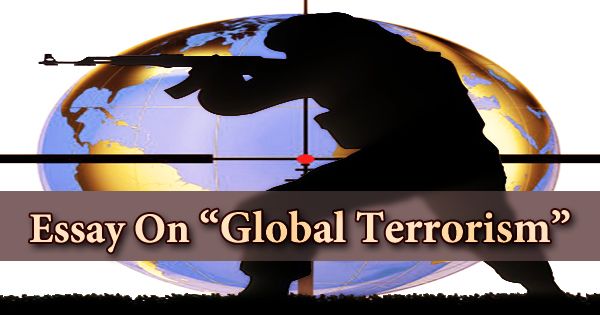Introduction: Terrorism is not confined to any nation, religion, or caste in particular. Anyone who indulges in terrorist acts, whether indigenous or foreign, is a terrorist and a threat to humanity’s peaceful life. Terrorism and terror modules are present in a variety of major locations around the world, which is referred to as global terrorism. Today, the world is linked in ways that have never been seen before in history. As a consequence, events in one part of the world have an effect on other pieces. This has never been more apparent than in the case of terrorism.
Global Terrorism: The use of violence and coercion is referred to as ‘terrorism’ to achieve political goals. Suicide bombings and attacks on foreign soil are two examples of global terrorism. Terrorism has no meaning because it is not sponsored by a fair-minded society. Nonviolence, reality, and goodwill often triumph over terrorism, resulting in peace. The attacks of September 11, 2001, in which members of a militant organization called Al Qaeda flew planes into the World Trade Center in New York City, was a significant example of global terrorism. Ordinary people now have to schedule business trips or holidays around variables such as whether or not the destination is safe, what routes pose the least risk, and how much time to take security control into account. Moreover, people in their own countries no longer feel safe because terrorist strikes have taken place in countries that were deemed safe and in different locations, such as malls, pubs and even thoroughfares.
However, not all terrorism is carried out on such a wide scale, and suicide bombings killing civilians and other groups of people are more common in countries around the world. Terrorism, which began in small pockets, has reached a global level. It has spread like wildfire, especially in developing countries with low literacy and culture. Politicians seeking a fast rise to power use fiery speeches to provoke and inspire young people. Most often, any person who does not agree with their beliefs is a non-believer who uses religion as an excuse and should therefore be destroyed. It affects not only the nation in which the violence or threats take place when terrorism takes place, but it includes several countries. In order to try to deter terrorist groups from succeeding in their cause, tighter security and global cooperation is also needed.
Effects of Terrorism Globally: Terrorism directly and indirectly has economic consequences as well. Terrorists target buildings and areas that are financially or visibly significant, or both. They devastate buildings, machines, factories, transportation, and other economic tools, with rebuilding costs ranging from thousands to billions of dollars. Terrorist attacks also have a negative impact on financial markets, trade, insurance, and tourism.
After World War II, the new version of terrorism, the one we are most familiar with, was engendered. Nationalist movements began to spread all over lands that were European empires’ colonial outposts. These movements were able to draw attention to their causes and exert control over foreign policy, thanks to a well-connected world. People were fast to pick up on this strategy in other parts of the world to bring local problems to global attention and modern terrorism was born.
Terrorism has also led to the rise of nationalism and the increased distrust of immigrants and refugees and international companies and cultures. Prejudice is on the rise across the world, and countries are closing their borders to refugees, reducing the diversity and scale of economic transactions and having political implications. The path of peace and tolerance is strongly professed by all the major world religions, and they condemn any sort of violence and hate. Looking back through history, we can see that only certain cultures that practiced tolerance and peaceful coexistence have survived to the present day; all the others have been destroyed.
Conclusion: Terrorism cannot and should not continue; it is very much the fact of modern times, and the mere possibility of a terrorist attack is sufficient to create fear and panic in the population as a whole. The fact that global terrorism has influenced policy decisions to a large degree is also not to be ignored. It has devastated nations and communities; families have been wiped out and towns and villages have been destroyed to the ground. The only thing it does is spread hatred and bloodshed. In the ordinary sense of the word, fighting terrorism isn’t a battle. Terrorism is more of a tactic than an organization. This makes it much more difficult to fight against it and win because the enemy is invisible and constantly changing.
















